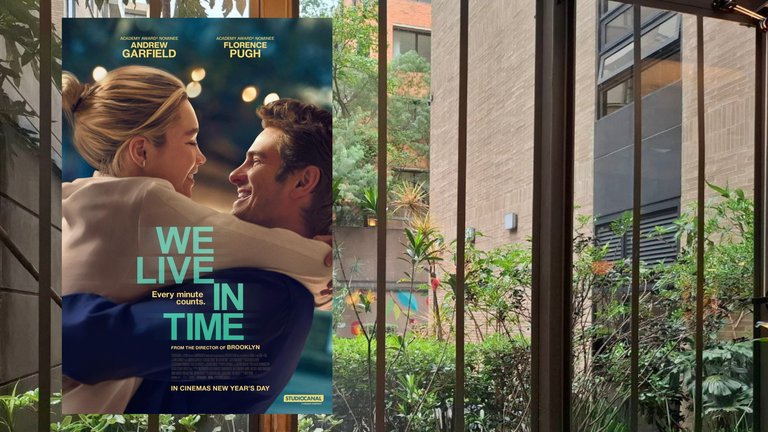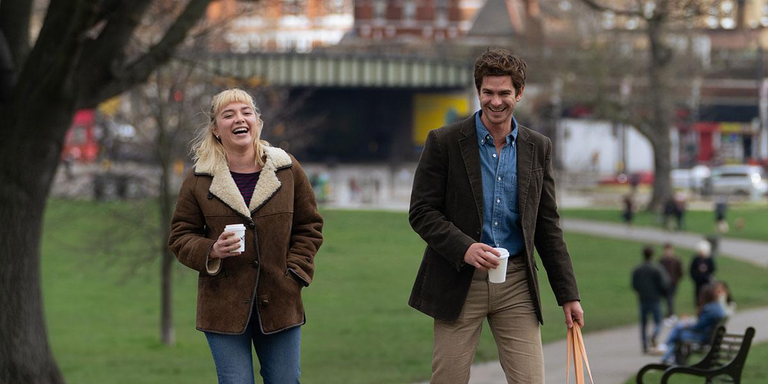Trascendencia y legado en "El tiempo que tenemos"

Encontrar una historia de amor bien elaborada y que no se sienta como un cliché más del montón puede ser un desafío en los tiempos actuales. "El tiempo que tenemos" hizo la tarea y lo logró. Además, aborda temas que se han utilizado antes como herramienta para movilizar las fibras más sensibles, pero sin llegar a ser excesivamente melodramática. En ese sentido, es una película de drama y romance bien equilibrada, que se disfruta, conmueve, pero sobre todo, nos invita a reflexionar sobre cómo estamos viviendo nuestra vida.
La historia de Almut y Tobías es una historia que inicia por el azar (o la suerte?), luego de que ella lo atropella a él, justo cuando esté se regresa a casa despues de comprar un bolígrafo para poder firmar su divorcio.
Se enamoran rápidamente, pero ambos traen consigo las heridas de sus relaciones anteriores. En el caso de él, su pareja escogió su profesión por encima de la relación, en el caso de ella, no se veía a sí misma como madre y esto le costó la ruptura. Este punto es sumamente importante, porque la decisión de formar una familia es algo que Almut más adelante reconsidera, quizás por el paso del tiempo, por haber encontrado a "su persona correcta", por el hecho de recibir una noticia que la pone en perspectiva sobre la vida y la muerte, o por la combinación de todas estas variables juntas.
Un punto central en la trama de la película es la trascendencia. ¿Logramos hacer en vida lo que fue verdaderamente importante para nosotros? ¿De qué formas nos recordarán? La necesidad de superarnos y cumplir nuestros objetivos lo hacemos ¿Por el placer de lograr algo en el presente? ¿O por la satisfacción de saber qué perdurará nuestra existencia a través del recuerdo?
Otro punto importante y que nos invita a reflexionar es que no tenemos garantía del tiempo que tenemos. Y a veces damos por sentado esto. La intención de vivir y disfrutar del presente en su totalidad no es solo desde un punto de vista hedonista, también se trata de vivir ese presente como si fuera lo único que tuviéramos, y de ser así ¿qué haríamos con ese regalo que es cada pedacito de vida (el día a día)? ¿Solo nos dedicaríamos al disfrute o, por el contrario, también nos exigiríamos y retaríamos hasta conseguir esa satisfacción mayor que anhelamos?
El tiempo que tenemos es una película sobre el amor y la configuración de una relación de pareja, sobre la decisión de formar una familia, sobre la salud y la enfermedad, lo efímero de la vida, sobre los sueños y la necesidad de cumplirnoslos y sobre el legado que dejamos. Los actores principales, Florence Pugh y Andrew Garfield destacan por sus actuaciones limpias, humanas y sensibles. Es bonito cuando sientes que no se trata de una película sino de la vida de alguien, con todos sus matices.
Intenté en lo posible no hacer spoilers en esta reseña, para que la vean y disfruten!


Finding a well-crafted love story that doesn't feel like just another cliché in the bunch can be a challenge in today's times. “The Time We Have” did the homework and succeeded. Moreover, it tackles themes that have been used before as a tool to tug at the heartstrings, but without becoming overly melodramatic. In that sense, it is a well-balanced drama and romance film that is enjoyable, moving, but above all, invites us to reflect on how we are living our lives.
The story of Almut and Tobias is a story that begins by chance (or luck?), after she runs him over, just as he is returning home after buying a pen to sign his divorce.
They quickly fall in love, but both bring with them the wounds of their previous relationships. In his case, his partner chose his profession over the relationship, in her case, she did not see herself as a mother and this cost her the breakup. This point is extremely important, because the decision to start a family is something that Almut later reconsiders, perhaps because of the passage of time, because she has found “her right person”, because she receives news that puts her in perspective about life and death, or because of the combination of all these variables together.
A central point in the plot of the film is transcendence: did we succeed in doing in life what was truly important to us? In what ways will we be remembered? Do we do it for the pleasure of achieving something in the present, or for the satisfaction of knowing that our existence will endure through memory?
Another important and thought-provoking point is that we have no guarantee of the time we have. And sometimes we take this for granted. The intention to live and enjoy the present in its entirety is not only from a hedonistic point of view, it is also about living that present as if it were the only thing we had, and if so, what would we do with that gift that is every little piece of life (the day to day)? Would we only dedicate ourselves to enjoyment or, on the contrary, would we also demand and challenge ourselves until we achieve that greater satisfaction we long for?
The Time We Have is a film about love and the shaping of a relationship, about the decision to start a family, about health and illness, about the ephemerality of life, about dreams and the need to fulfill them, and about the legacy we leave behind. The lead actors, Florence Pugh and Andrew Garfield stand out for their clean, humane and sensitive performances. It's nice when you feel that it's not about a movie but about someone's life, with all its nuances.
I tried as much as possible not to make spoilers in this review, so watch it and enjoy!

Todas las imágenes de esta publicación son de mi autoría, editadas en snapseed. El contenido también es original y propio.
All images in this post are my own, edited in snapseed. The content is also original and mine.
Posted Using InLeo Alpha

Es una increíble reflexión sobre el amor, el tiempo y la trascendencia. Esta es una de las películas qué deseo ver. Me encanta que el film sea romántico, se dice que es el mejor del año. Además, exterioriza temas profundos de la vida, las decisiones y esos puntos efímeros de la propia existencia. Los seres humanos somos tan impredecibles. Hace una increíble reflexión sobre nuestros propios cuestionamientos. La reseña fue muy sincera, concisa, emotiva y crítica.
Me da gusto leerte porque sé que eres un conocedor del séptimo arte 👌🏽gracias! Y ansío leer tu reseña de esta película